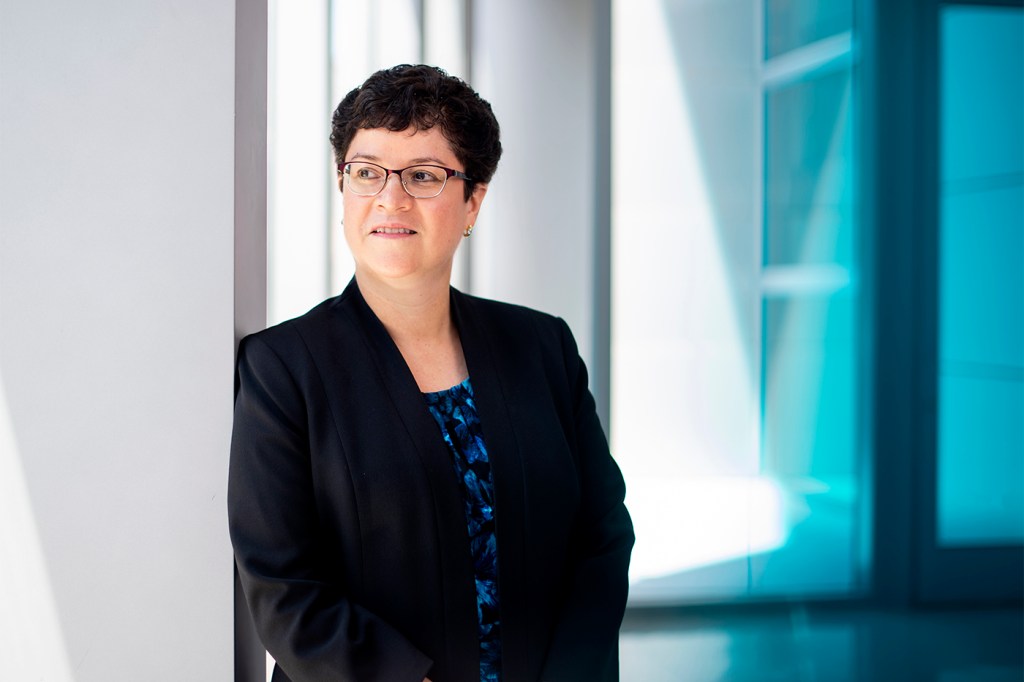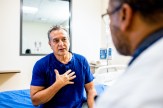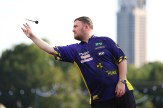New dean Carmen Sceppa is preparing Northeastern’s Bouvé College of Health Sciences for the future of healthcare in the age of artificial intelligence

The crisis of American healthcare is a contentious issue throughout the United States, and Carmen Sceppa, the new dean of the Bouvé College of Health Sciences, wants in on the debate.
Among her many goals is to develop a national healthcare leadership role for Bouvé while also building consensus among its three divisions: the School of Pharmacy, the School of Nursing, and the School of Health Professions. Sceppa is planning a “Bouvé summit” in the fall, to be followed by a global health conference in February. These meetings will help Bouvé articulate a mission statement designed to anticipate and influence the ongoing changes within the healthcare industry.
Additionally, Sceppa is pursuing areas of interdisciplinary study in line with Northeastern 2025, the university’s academic plan which creates a globally networked ecosystem for learning, research, innovation, and entrepreneurship. The plan is driven by humanics, a curriculum that integrates three new literacies—understanding technology, understanding data, and understanding what it means to be human—in the age of artificial intelligence.
Sceppa, a nutrition scientist who earned her medical degree at Francisco Marroquin University in her native Guatemala, has focused her research on the well-being of the elderly in terms of preventive medicine, lifestyle choices, and other areas. Her pioneering work on resistance exercise in older adults with diabetes has been translated into clinical practice by the American Diabetes Association and adopted as standard of care.
“Bouvé covers the whole gamut between cells and society, which is a phrase coined by the National Institutes of Health,” Sceppa says. “It’s everything from how a light molecule can become a drug that is used to treat cancer, all the way to the laws and policies that are related to health. As we train students, we need to be in tune with the healthcare industry, so that we are preparing students based on what the market needs are, based on what the barriers are, with a skill-set that is very agile, in the Northeastern way.”
According to a recent Northeastern Gallup poll on the future of work, 70 percent of Americans believe that artificial intelligence will eliminate jobs and revolutionize a swath of industries. How can Bouvé help students prepare for the era of automation?
We need to understand better—with our trainees, with our students, and in workforce opportunities—how we use technology in a way that enhances care and does not substitute for the human provider. For example, patients that are weighing their options about cancer medications want to know about the side effects. What is the prognosis? What are the pros and cons? That is a conversation that the patient will want to have with a person.
If you say something to a patient, and the patient retracts and makes a face, you have to be able to understand the nonverbal cues. These are communication skills.
I’ve been thinking about ways in which we can capitalize on the concept of humanics. Bouvé is human-centered, because all of the work that we do is in and for humans. How can we take advantage of the emerging technologies in artificial intelligence, machine learning, data science, and computer science in order to work together with the other colleges?
How can you connect Bouvé to the national healthcare discussion?
The healthcare system landscape is changing very rapidly. What I’d like to see is how the clinicians that are out there in the real world can inform the researchers. The clinicians know what the barriers are for delivering quality care, based on emerging technologies, artificial intelligence, data, analytics, devices, etc.
Marrying those two worlds—the researcher who is asking the questions, and the clinician who knows the barriers and issues—can help us tap into use-inspired research. I see the opportunity for Bouvé to be working across colleges within the university and with our partners across the world, locally, nationally, and internationally, to be able to do that.
How does your personal story influence your leadership of the college?
The fact that I have experience as a minority person living in this country has been very important for me. I want to create a culture of inclusion and diversity.
As a physician, I chose not to practice medicine in the U.S. because I was against seeing patients for five to 10 minutes at the most, and not being able to develop a relationship in a way that I could understand the patient. And so I decided to go for the route of research and education, because I felt it was more impactful in terms of the wide net that you can reach through evidence-based research and educating the next generation of health professionals.
What are the literacies that a Bouvé student needs for the future?
In Bouvé, there is the whole competency of working as a team, where you have to understand the other disciplines, in the way that a nurse works with the physical therapist, the nutritionist, the pharmacist, and others. That inter-professional approach is one that we can ensure is robot-proof.
Students majoring in health sciences, which is our most sought-out major, can do interdisciplinary work in data science, business administration, environmental health, sociology, and psychology. Those are the five big domains in which we see the emerging technologies really influencing public health.
We’re now looking at pharmaceutical sciences—particularly in the biotechnology, nanotechnology, and biopharmaceutical areas—for skill sets that students can develop as part of a combined major with chemical engineering. We are also looking at combined majors with communication studies and with linguistics.
For media inquiries, please contact media@northeastern.edu.






